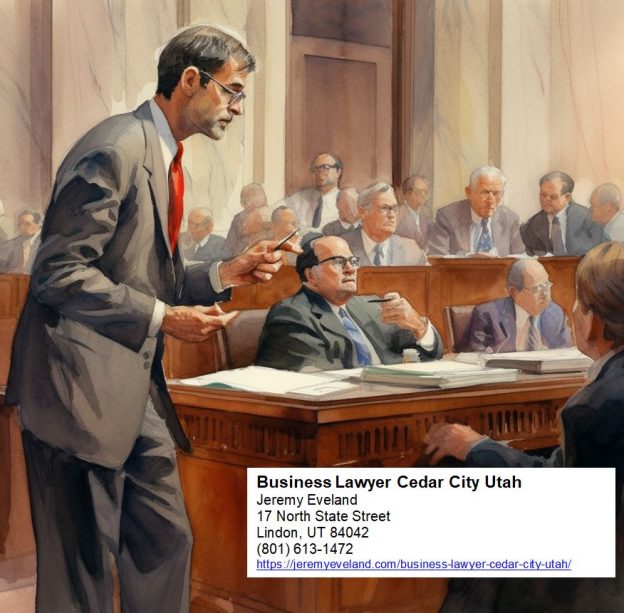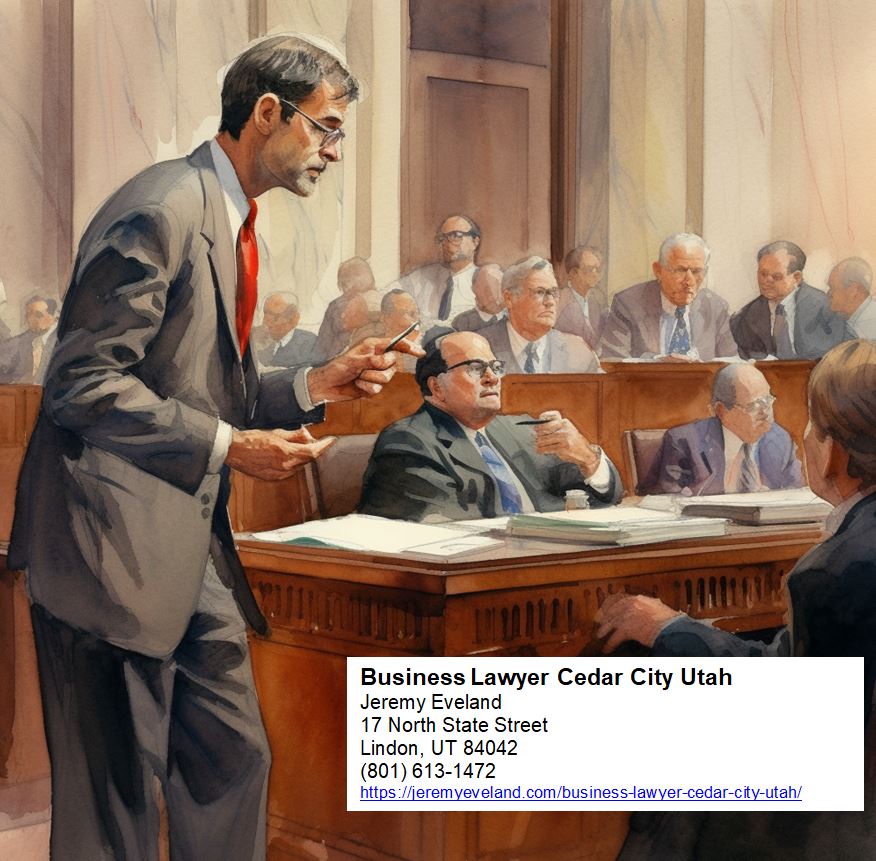What to Expect When Working with a Business Lawyer in Cedar City, Utah
When working with a business lawyer in Cedar City, Utah, you can expect a professional and knowledgeable legal representative who is dedicated to helping you achieve your business goals. Your lawyer will be able to provide you with advice and guidance on a variety of legal matters, including business formation, contracts, intellectual property, and more.
Your lawyer will take the time to understand your business and its needs, and will work with you to develop a strategy that meets your goals. They will be able to provide you with advice on the best legal structure for your business, as well as help you draft contracts and other legal documents. They will also be able to advise you on the best way to protect your intellectual property, such as trademarks and copyrights.
Your lawyer will also be able to help you navigate the legal system in Cedar City, Utah. They will be able to provide you with advice on filing taxes, obtaining permits, and other legal matters. They will also be able to represent you in court if necessary.
When working with a business lawyer in Cedar City, Utah, you can expect a professional and knowledgeable legal representative who is dedicated to helping you achieve your business goals. Your lawyer will be able to provide you with advice and guidance on a variety of legal matters, and will work with you to develop a strategy that meets your goals. They will also be able to help you navigate the legal system in Cedar City, Utah, and represent you in court if necessary.
Understanding the Different Types of Business Law in Cedar City, Utah
Business law in Cedar City, Utah, is a complex and ever-evolving field of law. It is important for business owners to understand the different types of business law in order to ensure that their business is compliant with all applicable laws and regulations.
The first type of business law in Cedar City, Utah, is contract law. Contract law governs the formation, performance, and enforcement of contracts between two or more parties. This type of law is important for businesses to understand in order to ensure that their contracts are legally binding and enforceable.
The second type of business law in Cedar City, Utah, is corporate law. Corporate law governs the formation, operation, and dissolution of corporations. This type of law is important for businesses to understand in order to ensure that their corporate structure is compliant with all applicable laws and regulations.
The third type of business law in Cedar City, Utah, is employment law. Employment law governs the relationship between employers and employees. This type of law is important for businesses to understand in order to ensure that their employment practices are compliant with all applicable laws and regulations.
The fourth type of business law in Cedar City, Utah, is intellectual property law. Intellectual property law governs the protection of intellectual property, such as trademarks, copyrights, and patents. This type of law is important for businesses to understand in order to ensure that their intellectual property is protected from infringement.
The fifth type of business law in Cedar City, Utah, is tax law. Tax law governs the taxation of businesses and individuals. This type of law is important for businesses to understand in order to ensure that their taxes are paid in a timely manner and in accordance with all applicable laws and regulations.
Finally, the sixth type of business law in Cedar City, Utah, is bankruptcy law. Bankruptcy law governs the process of filing for bankruptcy and the rights and obligations of debtors and creditors. This type of law is important for businesses to understand in order to ensure that their bankruptcy proceedings are handled properly and in accordance with all applicable laws and regulations.
By understanding the different types of business law in Cedar City, Utah, business owners can ensure that their business is compliant with all applicable laws and regulations. This will help to protect their business from potential legal issues and ensure that their business is successful.
Common Business Law Issues in Cedar City, Utah
Cedar City, Utah is subject to the same business laws as the rest of the state. Businesses in Cedar City must comply with the laws and regulations of the state of Utah, as well as any local ordinances. Common business law issues in Cedar City include:
1. Business Licensing: All businesses in Cedar City must obtain a business license from the city. This license must be renewed annually.
2. Taxation: Businesses in Cedar City must pay taxes to the state and local governments. This includes income taxes, sales taxes, and property taxes.
3. Employment Law: Businesses in Cedar City must comply with state and federal employment laws. This includes minimum wage, overtime, and anti-discrimination laws.
4. Contract Law: Businesses in Cedar City must comply with contract law when entering into agreements with customers, vendors, and other businesses. This includes the formation of contracts, the enforcement of contracts, and the resolution of disputes.
5. Intellectual Property Law: Businesses in Cedar City must comply with intellectual property laws when using trademarks, copyrights, and patents. This includes registering trademarks, protecting copyrights, and filing patent applications.
6. Environmental Law: Businesses in Cedar City must comply with environmental laws when disposing of waste and using hazardous materials. This includes obtaining permits, following regulations, and properly disposing of waste.
7. Consumer Protection Law: Businesses in Cedar City must comply with consumer protection laws when dealing with customers. This includes providing accurate information, honoring warranties, and protecting customer data.
By understanding and complying with the applicable business laws, businesses in Cedar City can ensure that they are operating legally and ethically.
The Benefits of Working with a Business Lawyer in Cedar City, Utah
Working with a business lawyer in Cedar City, Utah can be a great asset to any business. A business lawyer can provide invaluable advice and guidance on a variety of legal matters, from contract drafting and review to dispute resolution and litigation. Here are some of the benefits of working with a business lawyer in Cedar City, Utah:
1. Expertise: Business lawyers in Cedar City, Utah have a deep understanding of the laws and regulations that govern businesses in the state. They can provide advice on how to comply with the law and protect your business from potential legal issues.
2. Cost Savings: Working with a business lawyer can save you money in the long run. A business lawyer can help you avoid costly legal mistakes and ensure that your business is in compliance with the law.
3. Negotiation: Business lawyers in Cedar City, Utah are experienced negotiators. They can help you negotiate contracts, resolve disputes, and protect your interests in any business transaction.
4. Litigation: If your business is involved in a dispute, a business lawyer can represent you in court and help you achieve the best possible outcome.
5. Advice: Business lawyers in Cedar City, Utah can provide advice on a variety of legal matters, from contract drafting and review to dispute resolution and litigation.
Working with a business lawyer in Cedar City, Utah can be a great asset to any business. A business lawyer can provide invaluable advice and guidance on a variety of legal matters, from contract drafting and review to dispute resolution and litigation. With their expertise and experience, business lawyers in Cedar City, Utah can help you protect your business and achieve your goals.
How to Choose the Right Business Lawyer in Cedar City, Utah
Choosing the right business lawyer in Cedar City, Utah is an important decision for any business. A business lawyer can provide legal advice and representation in a variety of areas, including contract negotiation, business formation, and dispute resolution. When selecting a business lawyer, it is important to consider the lawyer’s experience, qualifications, and reputation.
Experience: When selecting a business lawyer, it is important to consider the lawyer’s experience. Look for a lawyer who has experience in the specific area of law that your business needs. Ask the lawyer about their experience in the field and the types of cases they have handled.
Qualifications: It is also important to consider the lawyer’s qualifications. Look for a lawyer who is licensed to practice law in Utah and has a good standing with the Utah State Bar Association. Ask the lawyer about their educational background and any additional certifications or specializations they may have.
Reputation: Finally, consider the lawyer’s reputation. Ask for references from past clients and research the lawyer’s online reviews. It is also a good idea to speak with other business owners in the area to get their opinion on the lawyer.
By considering the lawyer’s experience, qualifications, and reputation, you can make an informed decision when selecting a business lawyer in Cedar City, Utah. With the right lawyer, you can ensure that your business is well-represented and protected.
Areas We Serve
We serve individuals and businesses in the following locations:
Salt Lake City Utah
West Valley City Utah
Provo Utah
West Jordan Utah
Orem Utah
Sandy Utah
Ogden Utah
St. George Utah
Layton Utah
South Jordan Utah
Lehi Utah
Millcreek Utah
Taylorsville Utah
Logan Utah
Murray Utah
Draper Utah
Bountiful Utah
Riverton Utah
Herriman Utah
Spanish Fork Utah
Roy Utah
Pleasant Grove Utah
Kearns Utah
Tooele Utah
Cottonwood Heights Utah
Midvale Utah
Springville Utah
Eagle Mountain Utah
Cedar City Utah
Kaysville Utah
Clearfield Utah
Holladay Utah
American Fork Utah
Syracuse Utah
Saratoga Springs Utah
Magna Utah
Washington Utah
South Salt Lake Utah
Farmington Utah
Clinton Utah
North Salt Lake Utah
Payson Utah
North Ogden Utah
Brigham City Utah
Highland Utah
Centerville Utah
Hurricane Utah
South Ogden Utah
Heber Utah
West Haven Utah
Bluffdale Utah
Santaquin Utah
Smithfield Utah
Woods Cross Utah
Grantsville Utah
Lindon Utah
North Logan Utah
West Point Utah
Vernal Utah
Alpine Utah
Cedar Hills Utah
Pleasant View Utah
Mapleton Utah
Stansbury Par Utah
Washington Terrace Utah
Riverdale Utah
Hooper Utah
Tremonton Utah
Ivins Utah
Park City Utah
Price Utah
Hyrum Utah
Summit Park Utah
Salem Utah
Richfield Utah
Santa Clara Utah
Providence Utah
South Weber Utah
Vineyard Utah
Ephraim Utah
Roosevelt Utah
Farr West Utah
Plain City Utah
Nibley Utah
Enoch Utah
Harrisville Utah
Snyderville Utah
Fruit Heights Utah
Nephi Utah
White City Utah
West Bountiful Utah
Sunset Utah
Moab Utah
Midway Utah
Perry Utah
Kanab Utah
Hyde Park Utah
Silver Summit Utah
La Verkin Utah
Morgan Utah
Business Lawyer Cedar City Utah Consultation
When you need help w\\from a Business Lawyer near Cedar City Utah, call Jeremy D. Eveland, MBA, JD (801) 613-1472 for a consultation.
Jeremy Eveland
17 North State Street
Lindon UT 84042
(801) 613-1472
Related Posts
Business Lawyer Taylorsville Utah
How Artificial Intelligence is Shaping the Future of Business Law
Estate Planning is Crucial for People of All Income Levels
Navigating Legal Challenges in Business Succession Planning
Business Lawyer Bountiful Utah
How To Structure A Merger Or Acquisition In Utah
How To Hire Employees Legally in Utah
10 Tips for Negotiating Lease Agreements
Business Lawyer Spanish Fork Utah
How To Start A Non-Profit In Utah
What are the Trademark Laws in Utah
Business Lawyer Pleasant Grove Utah
How to Calculate Overtime Pay in Utah
Business Lawyer Cottonwood Heights Utah
Understanding Utah’s Consumer Protection Laws
Comprehensive Guide To Hiring A Business Lawyer
Business Lawyer Springville Utah
Mergers and Acquisitions from a Legal Perspective
Business Lawyer Eagle Mountain Utah
Understanding Anti-Trust Laws in Utah
Business Lawyer Cedar City Utah
[geocentric_weather id=”7ed4a282-5c12-49ea-9f80-96eed47f54e1″]
[geocentric_about id=”7ed4a282-5c12-49ea-9f80-96eed47f54e1″]
[geocentric_neighborhoods id=”7ed4a282-5c12-49ea-9f80-96eed47f54e1″]
[geocentric_thingstodo id=”7ed4a282-5c12-49ea-9f80-96eed47f54e1″]
[geocentric_busstops id=”7ed4a282-5c12-49ea-9f80-96eed47f54e1″]
[geocentric_mapembed id=”7ed4a282-5c12-49ea-9f80-96eed47f54e1″]
[geocentric_drivingdirections id=”7ed4a282-5c12-49ea-9f80-96eed47f54e1″]
[geocentric_reviews id=”7ed4a282-5c12-49ea-9f80-96eed47f54e1″]



